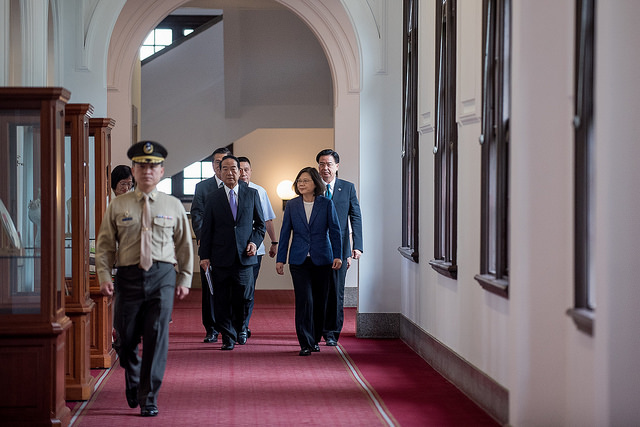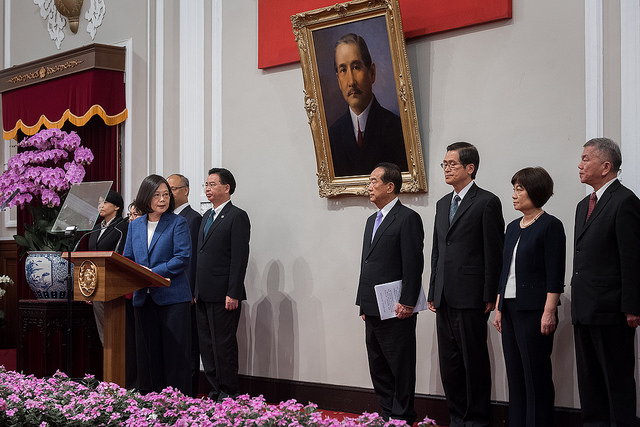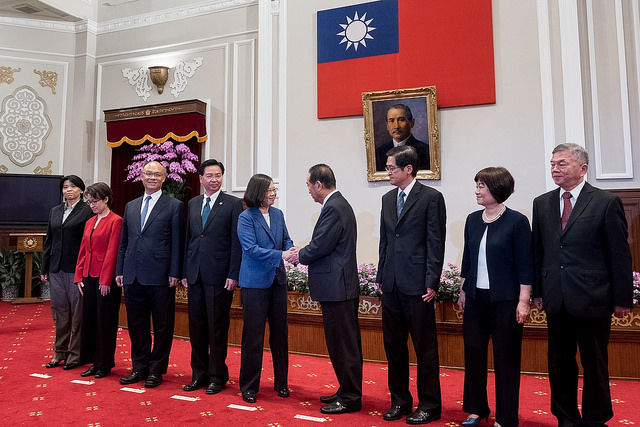News & activities
 News releases
News releases
President Tsai Ing-wen held a press conference on the afternoon of October 12 to announce that Senior Advisor to the President James Soong (宋楚瑜) will serve as her Leader's Representative at the 2017 APEC Economic Leaders' Week.
The following is a translation of President Tsai's remarks:
This year's APEC Economic Leaders' Week will be held in November. I am here today to formally announce that I have appointed Senior Advisor to the President James Soong to act as my Leader's Representative at the APEC Economic Leaders' Week activities.
APEC is the most important economic cooperation forum in the Asia-Pacific region, and an important venue where national leaders can gather to discuss regional cooperation issues and announce their collective consensus. Due to political factors, our country's president is unable to participate. But appointing a Leader's Representative to attend, representing the voice of Taiwan’s people, demonstrates our important role in regional cooperation. This is a very important mission, and a major responsibility for the Leader's Representative.
Last year’s APEC meetings marked the first time I appointed Mr. Soong, chairman of the People First Party, to serve as the Leader's Representative. And there’s a special significance in the fact that we’ve formed a delegation that transcends party affiliations for this important international event. Their hard work and outstanding performance last year was widely acclaimed.
We've asked Chairman Soong to take on this important task again this year, and clearly communicate with the APEC members about Taiwan’s contributions to regional development over the past year, and our ambitions for the future. To do that, we have strengthened the delegation working with the Leader's Representative to achieve their mission.
The spirit of APEC emphasizes open markets, economic and trade cooperation, experience sharing, and regional connectivity to pursue co-prosperity for the Asia-Pacific region and a common vision for the future. This is consistent with, and complementary to, the objectives of the New Southbound Policy we are currently promoting.
The New Southbound Policy redefines Taiwan's role in the Asia-Pacific region. We've been implementing that policy for a year now, seen some preliminary success, and will be investing more resources into the policy’s five flagship projects. We will also be sharing Taiwan's experiences in many areas with other countries, and establish mutually beneficial relationships.
Many New Southbound Policy target countries are APEC members. Through our participation in APEC, we need to actively interact with representatives from other countries, help them understand the New Southbound Policy’s objectives, policy principles, and concrete plans, and pursue more opportunities for cooperation. Implementing the New Southbound Policy economic strategies and investing resources will show that Taiwan can contribute to APEC.
At the same time, through interaction with leaders from other countries, and especially by cooperating with our close economic partners, we will promote regional prosperity and sustainable development. We are also willing to work within the APEC framework to interact and cooperate in good faith with mainland China, so that together, we can contribute to APEC's aims and objectives.
This is why I have given this year's delegation several tasks:
First, through concrete statements and actions, respond positively to the common goals of this year's APEC Economic Leader's Week.
The APEC theme for 2017 is "Creating New Dynamism, Fostering a Shared Future." We will actively respond to this appeal, and voice Taiwan's firm support for regional free trade and sustainable development. We will also emphasize our active contributions, working together with other APEC members in areas such as talent cultivation, developing food security capabilities, and promoting sustainable growth and employment for the digital age.
Second, employ the New Southbound Policy to highlight Taiwan’s contributions to APEC and responsibility for regional development.
At last year's APEC Economic Leader's Week in Peru, the first time we attended following the presidential election of 2016, our delegation focused on re-establishing connections between the new government and other APEC member countries. This year, the delegation's most important task is to connect our participation in APEC with the strategic objectives and efforts of our New Southbound Policy. I hope that, during the Economic Leaders' Meeting activities, bilateral meetings, and other events, we'll seize every opportunity to accomplish this task.
Third, work together as a team.
This year's APEC delegation includes representatives of industry, government, and academia. In addition to Chairman Soong, Minister without Portfolio John C. C. Deng (鄧振中) will serve as the delegation's senior advisor and spokesperson. The delegation also includes National Policy Advisor to the President Mei-yueh Ho (何美玥), National Development Council Minister Chen Mei-ling (陳美伶), Minister of Economic Affairs Jong-Chin Shen (沈榮津), National Security Council Advisor Lin Liang-jung (林良蓉), Legislator Hsiao Bi-Khim (蕭美琴), and senior experts from academia, industry, and news organizations.
I want everyone in our delegation to bring their expertise to bear in all the discussions, and share with Chairman Soong the responsibility for proactively interacting with other countries. We need to raise our profile at APEC and establish close, long-term ties with other countries.
I recently noted that the overall international situation, and the global economic and trade development model are changing. As a member of the international community, Taiwan cannot stand apart from global change, and must have the courage to find a way forward under changing circumstances. Working together with all parties to promote regional development and prosperity is our duty as a global citizen, and an important strategy for Taiwan's survival and development.
Taiwan must seize every opportunity for international participation, and promote global awareness of our contributions to regional development and irreplaceable soft power, increasing our visibility and autonomy. During this year's APEC Economic Leaders' Week, I want everyone in our delegation to give their best effort. And I’m confident that Chairman Soong can accomplish the mission that I have given him.
After President Tsai's remarks, Chairman Soong delivered remarks of his own, thanking the president for showing faith in him, and giving him this important mission. He said he was glad to have the opportunity to lead the Republic of China (ROC) delegation to participate in an important international event focusing on economic and trade issues, and let the world know that Taiwan stands prepared to contribute more to the global economy. Chairman Soong stressed that he will do his absolute best at APEC, and is confident that everyone in the delegation will do likewise.
Chairman Soong said that the last time he accepted the president's appointment as Leader's Representative, he mentioned in an interview that he had run for public office twice against President Tsai, and lost both times. So the fact that the president still chose him to represent the nation at an international event shows that Taiwan is a mature democratic society. It also means that Taiwan is non-partisan in its conduct of external relations. We want everyone to understand the democratic system that has taken root in Taiwan, and that we hope to contribute to humanity and culture around the world, he said.
Chairman Soong pointed out that APEC is among the most important of the international economic and trade conferences in which the ROC is currently able to participate. Last year, taking part in APEC as the representative of an economic entity called Chinese Taipei, the delegation shared information with the leaders of other economies from around the world about the efforts Taiwan has made over the past 70 years, and the successes that our country has achieved. This year, he said, he will act based on the president's instructions to seek out and create business opportunities and friendships that will enable Taiwan to engage in mutually beneficial economic and trade cooperation with other economies.
Chairman Soong opined that last year's APEC delegation was highly regarded because he and the other delegation members repeatedly stressed six specific issues at important conferences and other activities. Those issues were: (1) how Taiwan was transformed from an agricultural economy into a rapid-growth economy based on small and medium enterprises; (2) Taiwan's well-educated public and its strong emphasis on technical and vocational education; (3) the excellent quality and geographic coverage of Taiwan's healthcare system; (4) Taiwan's disaster preparedness and relief system, and flood prevention system; (5) Taiwan's emphasis on high technology, and its efforts to enhance agricultural production, increase agricultural household income, and preserve rural environments; and (6) his personal experience with infrastructure development.
Chairman Soong also said that massive changes in the international situation over the past year indicate that although the global economy is now showing some faintly positive signs, the international political picture remains fraught with uncertainty, and this will inevitably affect global economic and trade performance. Taking part in APEC affords opportunities to trade views with important world leaders, so the delegation, said the chairman, will certainly take advantage of this chance to collect valuable information. And more importantly, these experiences can be turned into opportunities to usher in the future with the rest of the world.
Chairman Soong stressed that although Taiwan is small, its experience is a common asset and a point of pride. In mentioning this asset, we are referring to more than just economic development. We are also talking about a fair society that pays equal attention to economic growth and equitable distribution of the fruits of growth. And we are talking about our democracy and freedom, which entail respect and tolerance among different ethnic groups, cultures, and religions. Therefore, said the chairman, when he attends the APEC Economic Leader's Week activities to share Taiwan's experience with leaders from around the world, he will be confident rather than complacent, with a moderate attitude of equality and reciprocity.





